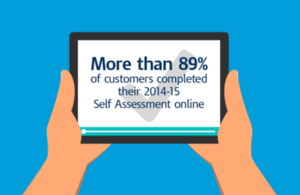Another record breaking year for Self Assessment
The number of Self Assessment returns completed on time once again breaks records with over 10 million submitted.

Self Assessment 2016
HM Revenue and Customs has revealed that 10.39 million Self Assessment tax returns were completed ahead of the 31 January deadline; that’s more than 92% of the total returns expected, and 150,000 more than last year.
More than 89% of customers (9.24 million) opted to use HMRC’s online Self Assessment service to calculate and pay the tax they owe, continuing the growing trend to deal with the tax authority electronically.
This year the deadline fell on a Sunday, but that didn’t mean that customers stopped for a day of rest – more than 385,000 completed their return online yesterday, beating the midnight cut off.
29 January was the busiest day with 513,271 returns completed – that’s more than 21,386 returns received per hour. The busiest time was between 14:00 and 15:00, with 50,358 customers – 14 per second – clicking submit.
Ruth Owen, Director General for Personal Tax said:
We all know it’s easy to put off completing your Self Assessment tax return, which is why it’s fantastic to see more customers than ever before completing theirs on time this year.
Each year we’re dedicated to making the Self Assessment process easier and more intuitive. Our biggest innovation this year was the launch of the online Personal Tax Account, with more than 825,000 customers accessing it as they completed their tax returns. Our new online tools proved just as popular with more than 364,000 customers interacting with our virtual assistant and taking part in webchats in the last 3 weeks of January, ensuring they were able to click submit before the 31 January deadline.
It’s not only the online Self Assessment service which has seen some changes. Using new technology, HMRC has successfully checked 3.4 million returns and intercepted more than 17,000 fraudulent or incorrect repayment claims, worth more than £96 million.
The technology prevents criminal attacks and ensures that customers with legitimate claims are protected.
Jennie Granger, Director General for Enforcement and Compliance said:
Our success in using cutting-edge technology to sift and sort through millions of pieces of data is stopping fraudulent repayments in their tracks.
Our highly skilled tax specialists are experts at reacting quickly to identify suspicious activity, protecting tax revenues that fund essential public services.
For anyone who still has not filed their return, help and advice is available on GOV.UK or from the Self Assessment helpline on 0300 200 3310 (open 8am to 8pm, Monday to Friday, and 8am to 4pm on Saturday).
Notes for Editors
-
Self Assessment facts summary: * 11.26 million SA returns due * 10.39 million returns were received in total * Around 870,000 SA returns still outstanding * 10.39 million returns received by midnight on 31 January (92% of total issued) * 9.24 million returns filed online (89%) * 1.14 million returns filed on paper (11%) * More than 4.45 million returns received in January 2016 (43% of total received) * 823,000 returns received on 30 and 31 January (18% of total returns received in January) * Busiest hour: 14:00 – 15:00 on 29 January – 50,358 returns received (839.3 per minute; 13.9 per second). * N.B. The figures are sourced from Self Assessment management information from the Computerised Environment for Self Assessment as at 01 February 2016 for the 2014-15 tax year.
-
The penalties for late tax returns are: * an initial £100 fixed penalty, which applies even if there is no tax to pay, or if the tax due is paid on time; * after 3 months, additional daily penalties of £10 per day, up to a maximum of £900; * after 6 months, a further penalty of 5 per cent of the tax due or £300, whichever is greater; and * after 12 months, another 5 per cent or £300 charge, whichever is greater.
-
There are also additional penalties for paying late of 5 per cent of the tax unpaid at 30 days, 6 months and 12 months.
-
Examples of the kind of cases where they can make these types of claims: * Online criminals jailed for £1m attempted fraud using stolen data * Essex accountant jailed for tax fraud * Accountant’s tax gamble backfires
-
You can claim a refund if you paid too much tax, because you: * made a change to your tax return after you filed it * entered the wrong amount when paying your Self Assessment bill * stopped being self-employed and have payments on account
-
Repayments for overpaid tax through Self Assessment can be reclaimed through an online process if you filed your return online. If you did a paper return, you’ll usually get a tax refund paid directly to your bank account, if you included your bank details.
-
HMRC’s technology uses a sophisticated mixture of risk rules, scorecards and watch lists to look for both criminal attacks and dodgy claims. By using check first and pay after, money is paid to those who are legitimately due a repayment of tax.
-
HMRC also uses the same technology for VAT. Since its introduction in 2013, more than 4.8 million VAT repayments have been automatically risk checked, with over £1.3 billion being risk protected.
-
Follow HMRC Press Office on Twitter @HMRCpressoffice